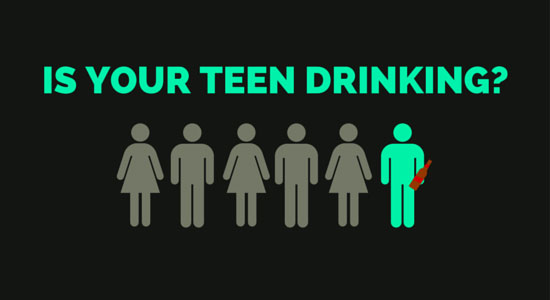Is Your Teenager Drinking?

Anonymous Student Surveys Reveal that 12- to 20-Year-Olds Drink 11% of All Alcohol Consumed in the United States
Many parents are unaware of their teens' experimentation with alcohol. Even though teens cannot legally purchase alcohol, they use creative strategies to gain access to beer, wine, and liquor.
Underage drinking leads to arrests, car accidents, injuries and even death. Parents rank as one of the most important factors in preventing underage drinking. So if you have a teen in your home, take a look at the startling statistics below to help stop underage drinking before it starts.
The Surprising Stats

The National Institute on Alcohol Abuse and Alcoholism (NIAAA) defines binge drinking as a pattern of drinking that raises blood alcohol concentration (BAC) levels to 0.08 or higher. This level of impairment typically occurs after 4 drinks for women and 5 drinks for men—in about 2 hours. According to one of the most shocking statistics on underage drinking, only 1 in 100 parents believe his or her child binge drinks. However, according to anonymous surveys given to high school students, 1 out of every 6 teens regularly binge drinks.
What Parents Can Do
People aged 12- to 20-years-old drink 11% of all alcohol consumed in U.S. Why does this behavior go unnoticed or unacknowledged by adults? Typically, parents and caretakers either aren't aware of the problem or aren't willing to cause conflict by raising the issue.
How to Tell if Your Teen is Drinking

Not sure if your child is drinking? Look for these telltale signs:
- Your teen regularly has sleepovers at friends' houses but asks your permission at the last minute.
- When your teen has friends over they speak in hushed tones and whispers when you're nearby.
- When going out, your teen evades your questions about where they are going, who they will be with, and what they will be doing.
- Your teen leaves the house with a duffle bag or tote bag they don't regularly carry.
- An alcohol bottle isn't easy to hide in a small purse, so teens usually conceal it in a sizeable yet innocent looking bag.
- Alcohol is missing from your house
- This usually is not a coincidence. Minors unable to purchase alcohol themselves typically take it from their home.
- Your teen comes home irritable, fatigued, and with glazed eyes after spending the night at a friend's house.
- Your teen is regularly missing curfew
- Your teen shows signs of anxiety or depression.
- Teens, just like adults, can use alcohol to self-medicate when feeling emotional distress.
Some of these signs could just be typical teenage behavior. However, if you notice several red flags, it's time to have a talk with your son or daughter about the dangers of underage drinking.
For those less inclined to cause a confrontation with their teen, contact a trained teen counselor for assistance, and take a look at how Being a "Cool Parent" Could Cost You. Remember, under Pennsylvania's Social Host Law, you could face hefty fines and jail time for allowing minors to drink in your home.
In these parenting situations, keep in mind that sometimes it's better to be the "Safe Parent," not the "Cool Parent." It's never too late to set some firm rules and limits for your child. It may save you and your teen from suffering the tragedy of a preventable accident.
Sources: “April is NCADD Alcohol Awareness Month.” Ncadd.org. April 6, 2015.
“The Alcohol Talk: What to Say if Your Teen Is Already Drinking.” Consumer.healthday.com. April 6, 2015.
“Drinking Levels Defined.” Niaaa.nih.gov. April 16, 2015.
.svg)






.webp)